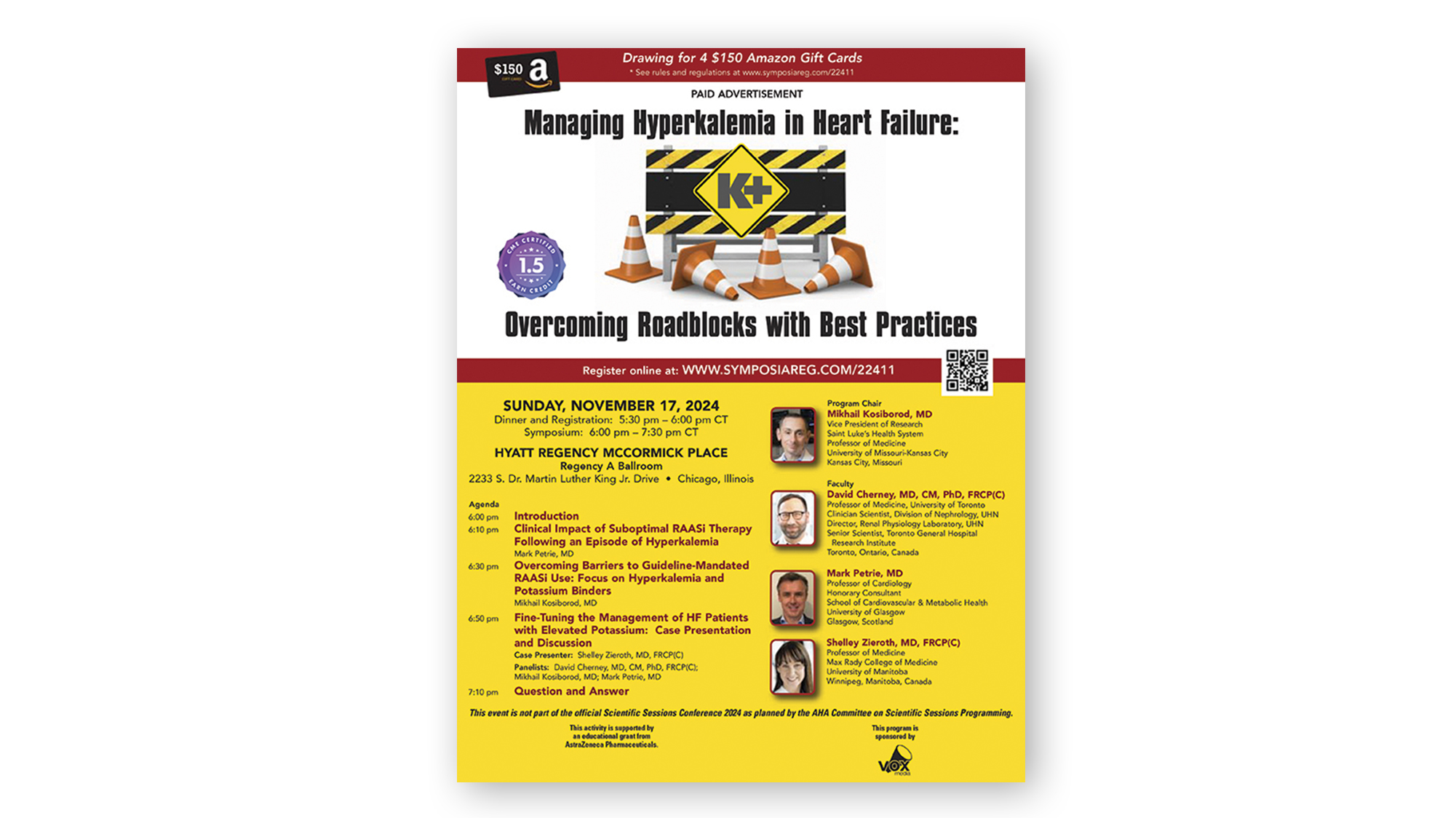Paid Advertisement

Did you know?
- Hyperkalemia is a roadblock to optimizing RAASi
- Down-titrating/discontinuing RAASi places patients at risk
- Novel K+ binders lower K+ AND overcome a barrier to optimizing RAASi, enabling HF patients to remain on RAASi & at target doses
SUNDAY, NOVEMBER 17, 2024
Dinner and Registration: 5:30 pm – 6:00 pm CT
Symposium: 6:00 pm – 7:30 pm CT
HYATT REGENCY MCCORMICK PLACE
Regency A Ballroom
2233 S. Dr. Martin Luther King Jr. Drive
Chicago, Illinois
CHAIR
Mikhail Kosiborod, MD
Vice President of Research
Saint Luke’s Health System
Professor of Medicine
University of Missouri-Kansas City
Kansas City, Missouri
FACULTY
David Cherney, MD CM, PhD, FRCP(C)
Professor of Medicine, University of Toronto
Clinician Scientist, Division of Nephrology, UHN
Director, Renal Physiology Laboratory, UHN
Senior Scientist, Toronto General Hospital Research Institute
Toronto, Ontario, Canada
Mark Petrie, MD
Professor of Cardiology
Honorary Consultant
School of Cardiovascular & Metabolic Health
University of Glasgow
Glasgow, Scotland
Shelley Zieroth, MD, FRCP(C)
Professor of Medicine
Max Rady College of Medicine
University of Manitoba
Winnipeg, Manitoba, Canada
Voxmedia LLC designates this live activity for a maximum of 1.5 AMA PRA Category Credit(s)™.
Drawing for 4 $150 Amazon Gift Cards! See rules and regulations at www.symposiareg.com/22411
PROGRAM SUMMARY
Renin-angiotensin-aldosterone system inhibitor (RAASi) therapy decreases cardiovascular morbidity and mortality in patients with heart failure (HF). Evidence-based HF guidelines support the titration of RAASi to achieve target doses to optimize treatment benefits. However, RAASi also increase the risk of hyperkalemia. Hyperkalemia is an electrolyte disorder characterized by elevated levels of serum potassium; if left untreated, hyperkalemia can lead to fatal cardiac arrhythmias, cardiac arrest, and sudden death. Hyperkalemia is a barrier to optimization of RAASi therapy in patients with HF; despite strong evidence for cardiorenal protective effects of RAASi, unfortunately down-titration or discontinuation of RAASi treatment is a common strategy to manage hyperkalemia in routine clinical practice; these actions place HF patients at increased risk of major adverse clinical events. Novel potassium binders effectively and safely lower serum potassium, potentially enabling HF patients to remain on optimal RAASi therapy. Therefore, in this educational initiative, a faculty of experts-- cardiologists Dr. Mikhail Kosiborod, Dr. Mark Petrie, and Dr. Shelley Zieroth, and nephrologist Dr. David Cherney—will explain, through lecture and “real-world” case presentation, best practices for managing hyperkalemia with potassium binders and facilitating maintenance of cardiorenal protection with RAASi.
AGENDA
6:00 pm: Introduction
6:10 pm: Clinical Impact of Suboptimal RAASi Therapy Following an Episode of Hyperkalemia
Mark Petrie, MD
6:30 pm: Overcoming Barriers to Guideline-Mandated RAASi Use: Focus on Hyperkalemia and Potassium Binders
Mikhail Kosiborod, MD
6:50 pm: Fine-Tuning the Management of HF Patients with Elevated Potassium: Case Presentation and Discussion
Case Presenter: Shelley Zieroth, MD, FRCP(C)
Panelists: David Cherney, MD CM, PhD, FRCP(C); Mikhail Kosiborod, MD; Mark Petrie, MD
7:10 pm: Question and Answer
EDUCATIONAL OBJECTIVES
- Describe the relationship between suboptimal RAASi therapy and poor cardiorenal outcomes
- Explain clinical data with, and demonstrate prudent use of novel potassium binders
- Identify patients who would benefit from anti-hyperkalemia medications
This program is sponsored by Voxmedia.
This activity is supported by an educational grant from AstraZeneca Pharmaceuticals.
This event is not part of the official Scientific Sessions Conference 2024 as planned by the AHA Committee on Scientific Sessions Programming.